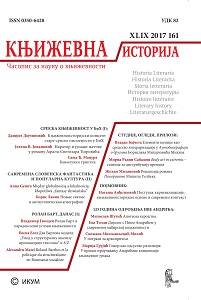Ролан Барт и парадоксални услови књижевности
Roland Barthes and the Paradoxical Conditions of Literature
Author(s): Vladimir GvozdenSubject(s): French Literature
Published by: Институт за књижевност и уметност
Keywords: literature;language;politics;society;subject;subjectivity;Modernism;aesthetic regime;philosophical Romanticism;
Summary/Abstract: Roland Barthes was, as he put it, an “unreliable subject” that somehow refutes every attribute with its antipode. Thus, it is necessary to think of deconstructing the “purity” of all concepts, including the concept of literature that was a privileged part of the bourgeois mythology of man. Barthes pleads for a paradoxical literature that absorbs many contradictions of modernity (freedom/constraint; history/form;creativity/normativity; intransitivity/transitivity; irrationality/rationality; literature/écriture).If we abstract different attitudes – related to the inherent pluralism of literature, the always insufficient deepening of language and the complicated relationship of writing and the community, as well as history and non-history – we will see that Barthes’ target is the sense of literature characterized by the hegemony of the bourgeois society and its institutions. The main hero of Barthes’ writings, as well as his ideas about writing (écriture), is language itself, understood not as an obedient instrument or repository of tradition, but as a point of responsibility for the statement. According to Barthes, the modern writer is a Sisyphean figure, who constantly strives to achieve the freedom of writing, although at the same time he or she is a constant witness to their writing falling into the quicksand of the “bourgeois”concept of literature. A key moment of his criticism lies in the different understanding of literature within the aesthetic regime (J. Rancière) – although literature itself is in a difficult situation, it now becomes the discourse of emancipation,because of the awareness of the circumstances of the chaotic modern life. Writing is forced to be tricky and clever enough to grasp the complex relations between the mind and the senses.
Journal: Књижевна историја
- Issue Year: 49/2017
- Issue No: 161
- Page Range: 191-211
- Page Count: 21
- Language: Serbian

